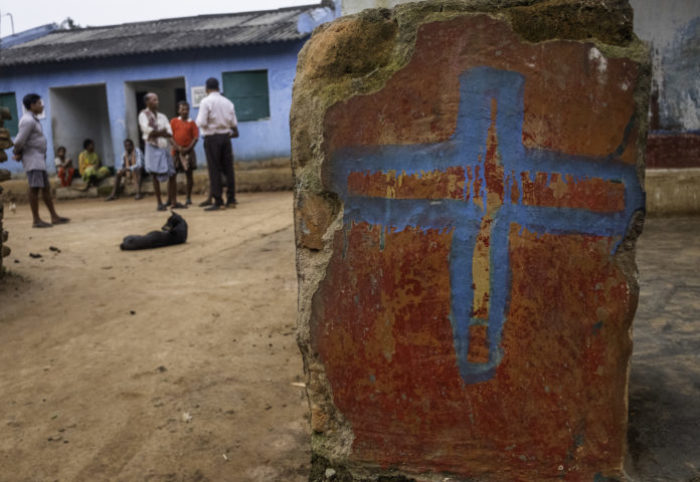Biden admin. warns of 'concerning' threats to Christians, religious freedom in India

The U.S. State Department voiced concerns about the state of religious freedom in India in its latest international religious freedom report as the Biden administration has faced criticism for its stance on India amid alarming increases in the persecution of Christians and religious minorities.
Secretary of State Antony Blinken unveiled the 2023 "International Religious Freedom Report" at a press conference Wednesday alongside U.S. Ambassador-at-Large for International Religious Freedom Rashad Hussain. The document includes a detailed analysis of the state of religious freedom in 199 countries and territories.
During his remarks Wednesday, Blinken touched upon the "concerning increase in anti-conversion laws, hate speech, demolitions of homes and places of worship for members of minority faith communities" in India. The report notes that 10 of India's 28 states have passed policies "restricting religious conversions for all faiths."
"Christian communities reported that local police aided mobs that disrupted worship services over accusations of conversion activities or stood by while mobs attacked them and then arrested the victims on conversion charges," Hussain added.
The section of the report devoted to India cited statistics from the United Christian Forum, finding that 731 attacks against Christians occurred in the country last year compared to 599 in 2022.
While the Indian government maintained to the country's Supreme Court that the advocacy organization had "exaggerated" claims of anti-Christian violence, UCF insisted that "the government data (on violence against Christians) downplays the severity of the situation."
The report elaborated on the government's April 2023 affidavit to the Indian Supreme Court, which asserted that requests to investigate anti-Christian violence gave an "exaggerated and wrong impression" of the attacks and characterized many of the incidents cited as examples of religiously motivated persecution as either "wrong or wrongfully projected."
In a counter-affidavit, a Roman Catholic diocese and several religious freedom advocacy groups who made the requests contended that the attacks were "not spontaneous or unconnected" but rather part of a "well-planned strategy" by Hindu groups that coincided with the enactment of religious conversion laws in some Indian states.
The State Department cited a finding from the advocacy group Open Doors' World Watch List report for 2023 that Christians in India found themselves "increasingly under threat … by an ongoing belief among some Hindu extremists that Indians ought to be Hindu — and any faith outside of Hinduism is not welcome in India."
According to Open Doors, "This mindset has led to violent attacks across the country and impunity for people who perpetrate this violence, especially in places where the authorities are also Hindu hardliners."
Warning of "an environment where any Christian who shares their faith can be accused of a crime, intimidated, harassed and even met with violence," Open Doors reported that 160 Christians died due to "faith-related reasons" between Oct. 1, 2022, and Sept. 30, 2023, while 2,228 Christian churches were attacked and 2,085 Christians were detained for "faith-related reasons" during the same time period.
The report detailed how hostility toward religious minorities was not limited to Christians, outlining "communal violence" that took place in the Muslim-majority state of Haryana that led to six deaths and nearly six dozen injuries.
While nearly 200 people were arrested in connection with the attacks that took place as a Hindu procession made its way through the town of Nuh and the state government denied a request for another procession, the Haryana government still demolished over 1,000 structures following the violence.
Despite state leadership's insistence that demolitions only targeted properties of those who were arrested for perpetrating the violence and/or were illegal enchroachments on government-owned land, there are suggestions that they were religiously motivated.
"Media reports said almost all the properties demolished belonged to Muslims, including in the Rohingya refugee camp in Tauru, and the overall demolition campaign was one of the largest in the region," the report stated.
"Local political activists said that demolitions deliberately targeted Muslims and left more than 500 homeless. Media reported that some of those with demolished homes said they had legal documents for their properties and had nothing to do with the violence; they also said they were given little to no advance notice of the demolitions," the report added.
The Biden administration has been criticized in recent months for not including India on the State Department's annual list of "Countries of Particular Concern," which is reserved for the world's worst violators of religious freedom.
The U.S. Commission on International Religious Freedom, a bipartisan agency that advises the federal government and U.S. Congress on religious freedom matters, expressed particular disappointment about India's absence from the list.
"In India, in addition to perpetrating egregious religious freedom violations within its borders, the government has increased its transnational repression activities targeting religious minorities abroad and those advocating on their behalf," said then-USCIRF Chair Rabbi Abraham Cooper and then-USCIRF Vice Chair Frederick Davie in a joint statement earlier this year.
Cooper and Davie vowed that "we will not be deterred and will continue our role as a congressionally mandated watchdog to ensure the U.S. government prioritizes religious freedom as a key component of U.S. foreign policy." Meanwhile, the advocacy group International Christian Concern lamented the absence of India from the list of CPCs as a "travesty of justice."
Ryan Foley is a reporter for The Christian Post. He can be reached at: [email protected]




























